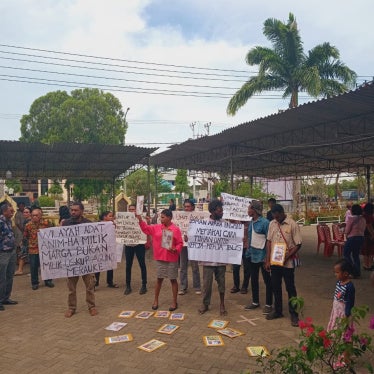His Excellency General Pervez Musharraf
President, Islamic Republic of Pakistan
Islamabad, Pakistan
Dear President Musharraf,
We are writing to urge your government to reconsider current plans to house new refugees from Afghanistan in camps in the Federally Administered Tribal Areas of the North-West Frontier Province (NWFP), not far from the Afghan border. We are also very concerned by the recent decision to locate camps inside Afghanistan in collaboration with Taliban authorities.
Afghan refugees are fleeing human rights violations, armed conflict and attendant violations of international humanitarian law and civil unrest. The rapidly deteriorating humanitarian situation in Afghanistan fueled by drought, constraints on humanitarian assistance and the onset of winter are also driving people from their homes.
We are aware of the immense difficulties Pakistan faces in trying to cope with these new arrivals from Afghanistan and appreciate the heavy burden your country has borne over the last two decades in hosting millions of refugees, often with insufficient support from the international community. But we are concerned that the proposed camps may place the health and safety of new arrivals at risk.
We welcome the allocation of sites for camps near Chaman, some of which have been identified by UNHCR as being secure and viable now that a safe access road has been cleared and water sources are nearing completion.
Location of camps inside Afghanistan
We are, however, deeply concerned by the recent decision to locate camps inside Afghanistan instead of allowing refugees to seek safety within Pakistan. The establishment of camps in Taliban controlled areas raises serious concerns about the security of refugees as well as access to humanitarian assistance. In particular, we are alarmed by reports of attacks by the Taliban on humanitarian agencies and staff in Afghanistan over recent weeks and fear that the security and protection of Afghan civilians could not be guaranteed in camps under Taliban control. Refugees are also vulnerable to politically or ethnically motivated attacks or forced conscription in camps located inside Afghanistan.
Turning away refugees at the border or deporting those who have already crossed and sending them to camps in Afghanistan where their safety cannot be guaranteed, is contrary to international law. In both scenarios, Pakistan is effectively returning Afghans to a country where their lives are seriously at risk. This violates the well-established principle of customary international law that no refugee may be returned (or "refouled") to a place where his or her life is threatened. In addition, when turning individuals away at the border, Pakistan is impeding the fundamental right of all individuals to seek asylum as articulated in the 1948 Universal Declaration of Human Rights.
We urge Pakistan to reconsider its decision to establish camps inside Afghanistan and instead to allow all refugees to enter Pakistan, at least on a temporary basis, where their safety can be more readily assured.
Location of camps in the Federally Administered Tribal Areas of the North West Frontier Province
In addition, we have several concerns about the proposed location of the camps in the Federally Administered Tribal Areas of the NWFP. The suggested sites are isolated and lack adequate water supplies. Their location, dangerously close to the Afghan border, could compromise the security of refugees and humanitarian workers and impede relief efforts. International standards require that camps be located at a safe distance from international borders.
We understand that the camps will be guarded and that access for humanitarian agencies may be restricted. As you are aware, international refugee protection standards prohibit refugees being held under detention-like conditions. We are also concerned that hostility to refugees and aid workers by elements within the local population is already high in some places and may increase in the event of any mass influx, making it even more dangerous and difficult for relief agencies to operate safely in these areas. Our concerns have been reinforced by reports that United Nations and NGO relief agencies have already been subject to harassment in the course of the preparation and construction of these camps
We respectfully urge your government to halt current plans to establish camps in the Federally Administered Tribal Areas of the NWFP and instead to identify alternative sites where the protection of refugees and humanitarian workers can be guaranteed. Camps should be located in areas with adequate infrastructure and water supply and humanitarian workers should have full, free and unimpeded access to the camps. Such camps should be established as a matter of urgency in order to prepare for new refugee flows.
Open borders and separation of armed and militant elements
We also urge you to open Pakistan's borders with Afghanistan, working with appropriate agencies to develop a mechanism for separating and disarming armed and militant elements from the civilian refugees at the border in a way that both protects the refugees and guarantees Pakistan's security. Because of the border closures, thousands of refugees have been forced to pay exorbitant prices to smugglers in order to reach Pakistan and are endangering their lives in the process.
Again, we appreciate the assistance your government is already providing to refugees, and recognize your resource and security concerns. We believe, however, that those concerns can be balanced with refugee protection. Rest assured that we will be doing all we can to press for additional humanitarian assistance for Afghan refugees in Pakistan.
Yours sincerely
Rachael Reilly
Refugee Policy Director
Human Rights Watch
Sidney Jones
Executive Director
Asia Division
Human Rights Watch
Cc: His Excellency Lt. Gen. (Retd.) Moin-ud-Din Haider
Federal Minister for Interior
Cc: Dr. Maleeha Lodhi
Ambassador of Pakistan to the USA






